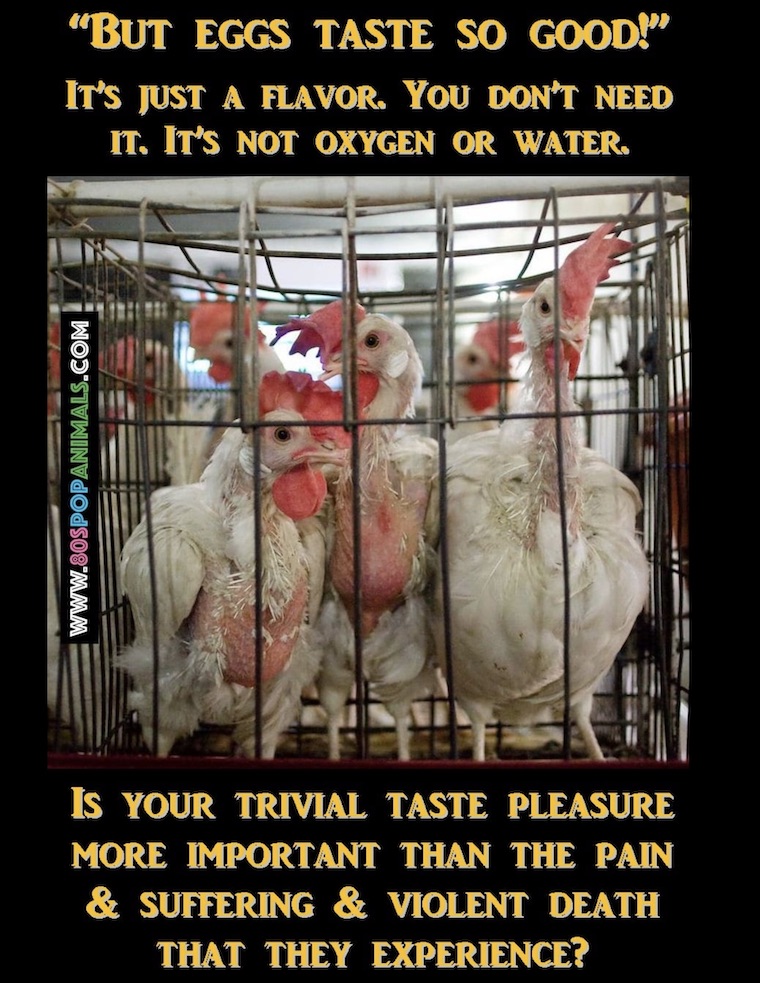
'But Eggs Taste So Good'
An Egg Production Article from All-Creatures.org
FROM
David
Jack James
January 28, 2021 Facebook post
The egg industry may be the cruelest of all industries that exploit and kill animals.

The egg industry may be the cruelest of all industries that exploit and kill animals because of the prolonged suffering inflicted on the greatest number of animals. Because of their size, chickens represent over 95% of the land animals who are exploited and slaughtered for food in the United States, followed by turkeys (2.5%), pigs (1.3%), cows (0.4%), ducks (.3%), and sheep (.07%), according to the U.S. Department of Agriculture (USDA).
Over 95% of egg-laying hens in the U.S. currently live in battery cages, according to the USDA. Approximately 10 hens spend their entire lives in cage that is about the size of a filing cabinet drawer, in which the space each hen has to move for her entire life is approximately the size of a piece of paper (8 1/2 x 11 inches). These cages are stacked on top of each other, and the hens are crammed together so tightly inside them that they canít spread their wings.
Birds confined in these horrendous conditions often go insane and peck
each other violently, sometimes even cannibalizing each other, which is why
the egg industry de-beaks them. De-beaking is a standard procedure and a
very painful mutilation: The beaks of these birds are literally cut off or
seared off. De-beaking causes chronic pain for chickens, and the U.S.
government acknowledges that it is standard procedure and extremely painful
for them in this document:
USDA's Laying Hen Welfare Fact Sheet. If you believe that
these chickens donít suffer, please read this document.
These hens also suffer from diseases due to unsanitary and hazardous conditions. Feces and urine fall from the cages above them through the cage floors made of wire. These hens are bred to produce up to 30 times more eggs than they would in nature. The constant, labor-intensive egg production takes a severe toll on their bodies. Hens naturally lay only 10 to 15 eggs per year, but humans have genetically tampered with their reproductive systems through generations of selective breeding so that they lay up to 300 eggs per year, more than their frail little bodies are designed to bear. Because the constant production of an abnormal quantity of eggs depletes their bodies of calcium, most of them suffer from debilitating, painful osteoporosis.
Itís constant misery for these animals because of the extreme confinement and overcrowding, toxic conditions of extreme filth, debilitating infections and diseases, and food and water deprivation. Once a henís egg production declines and she is no longer commercially viable (usually after about 18 months), she is sent to slaughter.
Male chicks born to egg-laying hens are considered non-profitable waste by the egg industry. They canít lay eggs, and they do not grow as large as the different breed of chickens who are slaughtered for meat. On the day that they are born, the males are separated from the females, and disposed of in extremely cruel ways. They are either tossed on a conveyor belt that drops them into a macerator to be ground up alive, or they are gassed to death with carbon monoxide, or sometimes they are just thrown into trash bags or dumpsters where they slowly die in agony, literally suffering to death.
The egg industry doesnít deny that all of this violence is standard procedure. And itís all legal. Do your own research and you will discover the horrible truth about the egg industry. If you purchase eggs, or any products that contains eggs, then you are paying for all of this pain and misery and torture that these birds experience. These animals are not machines. They are emotional beings with full self-awareness and central nervous systems, which means that they can experience pain and suffering, fear and despair, stress and misery.
CHECK OUT THESE PLANT-BASED EGG ALTERNATIVES:
- JUST Foods Ė https://www.ju.st/en-us/products/consumer/egg/scramble
- Follow Your Heart Ė https://followyourheart.com/products/veganegg/
- Vegg: https://thevegg.com/
- Neat Egg (Atlantic Natural Foods) Ė https://atlanticnaturalfoods.com/.../neat-the-neat-egg.../
- Bobís Red Mill: https://www.bobsredmill.com/.../gluten-free-vegan-egg...
- Ener-G Foods: https://www.ener-g.com/products/egg-replacer
- Vegan Easy Egg (Orgran) Ė http://www.orgran.com/products/vegan-easy-egg-2/
- Namaste Ė https://namastefoods.com/
When you are baking, there are many alternatives you may use instead of eggs: vinegar and baking soda, applesauce, soy yogurt, silken tofu, a ripe mashed banana, aquafaba (the liquid that chickpeas are soaked in), ground flaxseed, chia seeds, arrowroot powder, or a combination of water, oil, and baking powder. Do a little research to figure out what egg replacement works best with what you are baking.
PLEASE GO VEGAN. PLEASE STOP CAUSING PAIN AND VIOLENCE FOR TASTE PLEASURE!
Return to Egg Production Articles








